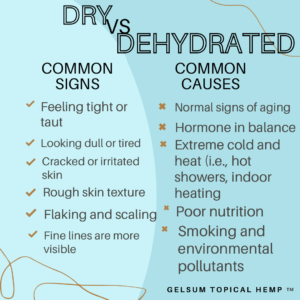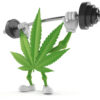Did you know there is a difference? Dry is a skin type. Dehydration is a skin condition.
DRY SKIN
If your skin is flaky, cracked or irritated, you’re considered to have dry skin. This means your skin actually lacks oil that keeps your appearance from glowing, youthful and fresh. This may or may not clear up by simply applying moisturizer. Moisturizers are oil based, occlusive agents. Some are thick and some are light weight. They do not penetrate to deeper layers of the skin but rather remain on top of the skin sealing in nutrient rich serums.
Recently, many people with this condition have turned to products containing CBD to alleviate their symptoms. However, caution is necessary. Applying too much CBD to your face as part of your skin regimen can be too drying. The active ingredient in Gelsum includes 100mg of pure CBD. (it is safe for all skin types as it is water soluble, plant based) CBD products usually in the form of an oil or a thick cream that are targeted to the “pain relief” market contain as much as 500-750mg in a similar application. This concentration can be useful as spot-treatment of sunspots or at the temple to help relieve a headache, however, it would be too drying if used daily as a face cream.
TREATING DRY SKIN: When you have dry skin it’s important to exfoliate. Using an exfoliant with large beads (ie. St Ive’s) can be too harsh and more irritating for your face. A chemical exfoliant, like lactic acid, can be far more gentle. Avoid using with other AHA’s or Retinol. (alternate use of either one for best results). Avoid any exfoliant on eczema or psoriasis type conditions. Avoid exfoliating when skin is cracked or has any open, oozing skin irritation. Always hydrate skin after exfoliating.
Dry skin conditions need extra moisture from a thicker, oil-rich cream, facial balm or a facial oil. Wash – finish with cold rinse, exfoliate 2x a week, apply serum to damp skin, moisturize with a thicker moisturizer.
DEHYDRATED SKIN
Dehydrated skin can eventually lead to dry skin as water depletion can also affect skin’s oil levels. Keeping your skin hydrated can be a constant battle. It is easier to visibly see if your skin is dry, not so easy for dehydrated skin. So we suggest the pinch test. Pinch a small amount of skin for a few seconds, under your eye or around your jowls, if skin snaps back, you’re most likely not dehydrated. It is recommended to use products that are water soluble based (ie. Hyaluronic acid) and use consistently. A hyaluronic acid based serum hydrates the skin by pulling water molecules directly from the air into your cells. Along with these water molecules the serum’s nutrients are infused directly into the skin’s surface to improve your skin’s ability to plump, soften & smooth texture and enhance its glow. Apply a moisturizer after as it seals the nutrients of a serum, locking them in.
One of the latest skincare trends in 2021 is called slugging. It is a skin care practice in which you apply an occlusive (ie. occlusives, such as petroleum jelly or thick moisturizer) to your face over other beneficial ingredients, such as serums (ie. Gelsum Topical Hemp™). Slugging skin care products that create a layer on the surface of your skin that keeps water and skin’s natural oils (aka sebum) sealed in. In other words, they prevent water and oil evaporation from the skin, which is also called transepidermal water loss.
Often, having dry or dehydrated skin is unavoidable and is influenced by your environment and lifestyle.
Conclusion for treatment: Both conditions will benefit from a nutrient rich serum to hydrate. It is especially important to apply any facial oil (for dry skin) and hyaluronic serum (any skin type) right after a shower when skin is still slightly wet or damp. It simply helps lock in the moisture from either one. Then it is important to moisturize after (dry skin a thick cream/oil and dehydrated skin a light weight moisturizer).
Hydrators and moisturizers both address the importance of making sure the skin is getting all the water it needs to fight dryness and dehydration, premature signs of aging and environmental damage. Knowing when and how to use each is your key to a healthy, glowing appearance!
To learn more about skincare, visit our BLOG.
Hydration vs Moisturizer, How can CBD improve skin health, Good, Bad and Ugly of the preservatives! A guide to understanding preservatives in skin care
References:


